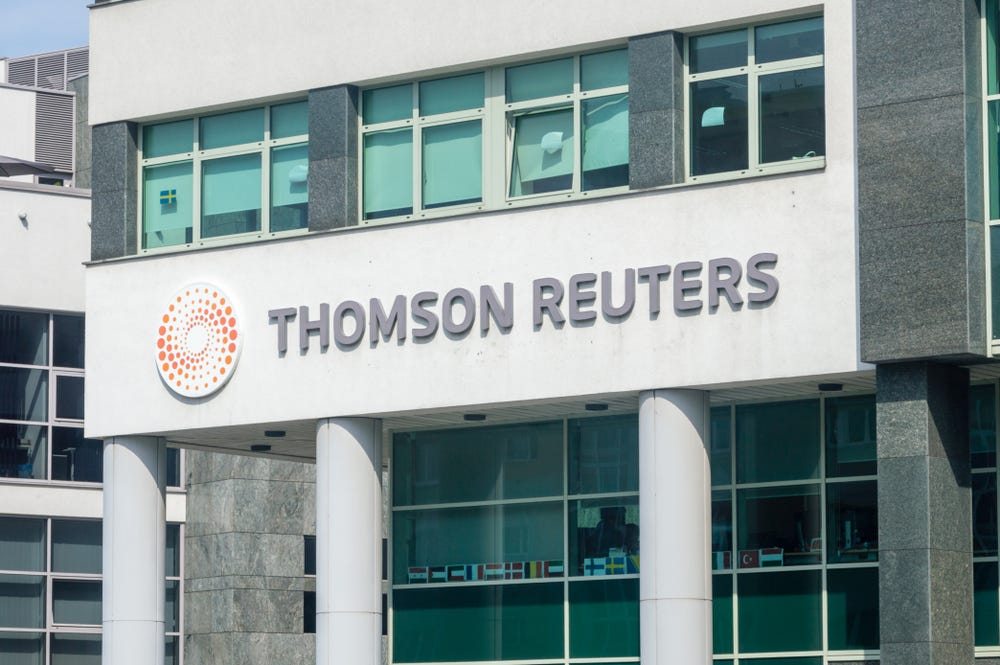E-Pluribus | May 12, 2022
Thomson Reuters, the BLM narrative and a firing; the Biden administration leans in to racial preferences; and higher education's free speech problem.
A round-up of the latest and best writing and musings on the rise of illiberalism in the public discourse:
Zac Kriegman: I Criticized BLM. Then I Was Fired.
At her Common Sense Substack, Bari Weiss continues to bring readers stories they might otherwise miss. This time, Zac Kriegman, a data scientist formerly at Thomson Reuters, writes of his experiences when he tried to write about claims of the Black Lives Matter movement that ran counter to the conventional wisdom.
I had been at Thomson Reuters for over six years—most recently, leading a team of data scientists applying new machine learning and artificial intelligence algorithms to our legal, tax and news data. . .
In 2020, I started to witness the spread of a new ideology inside the company. On our internal collaboration platform, the Hub, people would post about “the self-indulgent tears of white women” and the danger of “White Privilege glasses.” They’d share articles with titles like “Seeing White,” “Habits of Whiteness” and “How to Be a Better White Person.” There was fervent and vocal support for Black Lives Matter at every level of the company. No one challenged the racial essentialism or the groupthink.
This concerned me. I had been following the academic research on BLM for years (for example, here, here, here and here), and I had come to the conclusion that the claim upon which the whole movement rested—that police more readily shoot black people—was false.
The data was unequivocal. It showed that, if anything, police were slightly less likely to use lethal force against black suspects than white ones.
[ . . . ]
When I returned from my leave of absence, I was ready to post my summary to the Hub, where my colleagues regularly posted things about any number of hot-button issues. . . I took a deep breath and shared my post on the Hub. It was early May 2021.
Within an hour or two, the moderators had taken down my post.
[ . . . ]
So I did that, and the piece was reinstated. I was relieved. Such discussion about facts and statistics had to be permitted. It was impossible to report the news accurately if employees were not allowed to have internal, sometimes heated discussions about pretty much anything.
Then the comments started rolling in. A handful of BLM supporters, all of them white, said that, as a white person, I had no place criticizing BLM. They called my review of the academic literature “whitesplaining” (failing to note that many of the academics I cited were black). I was publicly derided as a “troll,” “confused,” “laughable,” and “not worth engaging with or even attempting to have an intelligent conversation” with. One colleague said: “I do not believe that there is any point in trying to engage in a blow-by-blow refutation of your argument, and I will not do so. My unwillingness to do so doesn't signal the strength of your argument. If someone says, ‘The KKK did lots of good things for the community—prove me wrong,’ I'm not obligated to do so.”
Notably absent from the attacks directed at me was even a single substantive challenge to the facts I was citing.
Read it all here.
Kenin M. Spivak: Biden’s Racial Preferences Gone Wild
In the name of diversity and inclusion, the Biden administration is looking to nonetheless limit the availability of various federal government offerings and opportunities based on raced-based criteria, reports Kenin M. Spivak for National Review.
Title VI of the Civil Rights Act of 1964 prohibits discrimination on the basis of race, color, and national origin in federally funded programs, and Title VII does the same in private employment. The Civil Rights Act of 1866 has been construed generally to prohibit the federal government from varying individual property and contract rights based on race or color. In Bostock v. Clayton County, the Supreme Court recently extended these protections to gender identification.
[ . . . ]
The New York Times reported in February that the administration is worried about these lawsuits and is drafting orders to help communities of color without defining them as such. For example, the Justice40 Initiative directs at least 40 percent of climate-change spending to “disadvantaged communities” and the administration’s effort to address inequity in home appraisals refers to neighborhoods, though its press release acknowledges its goal is to prevent appraisals from being a “proxy for racial demographics.”
These clumsy attempts at obfuscation may buy some time, but they are unlikely to change the result. The purpose of an administration that declares DEI a whole-of-government effort on its second day, repeatedly castigates “white privilege,” acknowledges its racial- and sexual-orientation goals, and heaps praise on the 1619 Project, Ibram X. Kendi, and the Abolitionist Teacher Network, which advocates “disrupt[ing] whiteness,” cannot be doubted.
Last month the administration floored the accelerator, issuing fact sheets, orders, and websites to deliver what it refers to as economic justice, educational equity, environmental justice, civil rights, health equity, criminal justice, housing justice, and global equality. The administration also announced that 140 agencies, including all cabinet-level agencies, are developing Equity Action Plans for “addressing — and achieving — equity in their mission delivery,” and published links to at least 25 of these plans.
Read the whole thing.
Stone Washington: The intolerance of free speech in higher education
Stone Washington, a PhD student and graduate teaching assistant at Clemson University, writes at The College Fix about the hostile environment for conservative free speech at Clemson University and Emory University School of Law. Washington says the limits schools try to put on speech to avoid “harm” end up causing more harm than they ostensibly intend to prevent.
Institutions of higher education must provide open forums of discourse that feature viewpoints from any and all assembled groups. If the majority of universities in America continue to selectively uphold student free speech rights, then it will only be a matter of time before every exercise of speech not mandated by the school will become outlawed.
The First Amendment right to free speech stands as one of the most important and sacred privileges guaranteed to all Americans in the U.S. Constitution. It safeguards one’s immutable right to voice an opinion without fear of being silenced or censored by the government.
Nat Hentoff, an award-winning journalist and prolific author, provided a cautionary warning on the vulnerability of the principle of free speech at none other than colleges and universities.
“A precedent has been set at, of all places, colleges and universities, that the principle of free speech is merely situational. … Once speech can be limited in such subjective ways, more and more expression will be included in what is forbidden,” he wrote.
Read it all.
Around Twitter
Via the Foundation for Individual Rights in Education, a reminder of the ACLU of the past and its willingness to defend free speech to the extreme:
Thomas Chatterton Williams says sometimes partial truth is even more dangerous that an outright lie:
Finally, Jonathan Chait, observes that when it comes to using the words “free speech,” he doesn’t think it means what they think it means:









